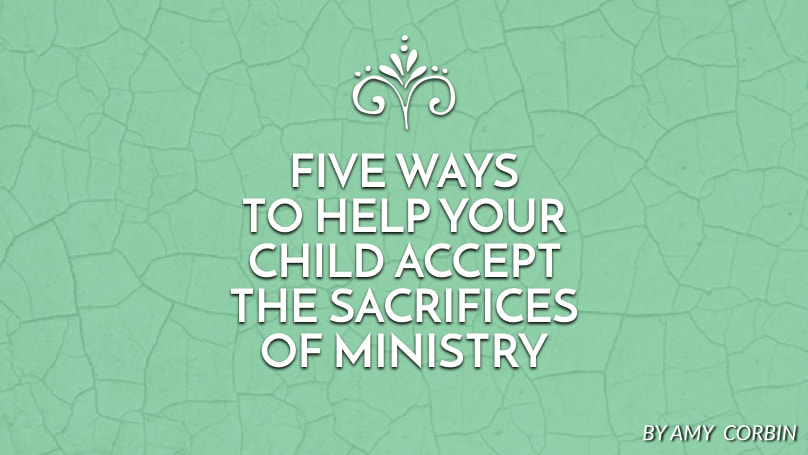|
When our family moved from Texas to the Pacific Northwest 10 years ago to be church planters, we felt prepared for the sacrifice and costs that would come our way. My husband and I had been in ministry for several years and had already stepped out in faith several times; we knew some sacrifice and cost would be involved. But we quickly realized that sacrifices would not only be asked of us but of our children as well, and that pill was much more difficult to swallow. My immediate response was to fix it. I didn’t want my children to have to wrestle through sacrifice so young. But I quickly realized "fixing it” wasn’t an option. The best thing I could do was recognize the costs they were experiencing so we could process it together in a God-honoring, emotionally healthy manner. Some of the things my daughters sacrificed were related to geography; they were so far away from friends and family. They missed family gatherings and celebrations, and that was hard. They left behind wonderful friends who shared their beliefs and morals and were thrown into a world that looked completely different. Our girls currently attend public schools in Vancouver, BC. While we absolutely love our schools and have so many good things to say about them, the reality is my girls haven't met a single Christian in the hallways. To try and help them through that season, I'd buy devotional books for teen girls. Sadly, the devotional books would only emphasize things like the need for surrounding yourself with Christian friends, and that simply isn’t an option for them. My girls also experienced sacrifice when it came to privacy and having their own space. When we moved, our home immediately became the church, the office, the fellowship hall, the children's and preschool area, etc. My girls had to learn the meaning of sacrifice the minute we moved. We had people in our home constantly; the lack of privacy was deeply felt. They have also experienced sacrifice of things and opportunities. As church planters, we live on a “missionary salary.” Our needs are always met but there is very rarely—if ever—room for extra. We have an incredibly full life and are extremely thankful for all God has given us. But the reality is, our kids do without quite a bit. We don’t go on vacations like their friends do, and we don’t have the nice things that many others do. We learn to live with less which honestly is a great but hard lesson to learn. We have also learned that they miss out on opportunities their “old” friends have. Because of social media, they see their friends having church, school and extra-curricular experiences they never will because of our calling. I know that these things are not essentials. Our lives are not in danger and, compared to other countries and regions, we have so much. But the sacrifices felt by my children is something I can't help but recognize. I know that it is hard for them to see others doing things we don’t get to because we have chosen to follow Jesus. But I cannot simply recognize it. I need to respond biblically to their sacrifices and feelings. And while we have not perfected this by any means, let me share a few ways we have learned to process this along the way. 1. We allow our children to feel the pain of sacrifices. In his book, Inside Out, Dr. Larry Crabb explains sacrifice and the feelings that follow so well. “Biblical change never requires us to pretend that things are better than they are. Christ wants us to face reality as it is, including all the fears, hurts, resentments and self-protective motives we work hard to keep out of sight, and emerge as changed people. Not pretenders. Not perfect. But more able to deeply love because we’re more aware of His live.” Ultimately, I want my daughters to be changed for His glory by our church planting journey. I know that cannot happen if we pretend everything is perfect along the way. We allow space to feel disappointment, pain and longing so that we can see our need for God in a way that will never be satisfied on this earth...continue reading  Amy lives in Vancouver, B.C., Canada with her husband, Tim, who serves as a church planting catalyst. They have three daughters. Tim and Amy are both originally from Dallas, Texas, but moved to Seattle, Washington, in 2007 where they were church planters for eight years in urban and suburban settings. Amy currently serves as the coordinator for church planter wives support with Vancouver church planting, as well as the North American Mission Board's consultant for church planter wives development. More from this author
2 Comments
12/17/2017 06:59:38 pm
The Lord always chose someone to be in that position, to rule over some people. There will be some tough choices to make and there will be some things to consider. We should know how to balance things, but let us always put God first in the list. We are all human beings and it is normal for us to be confused and that is the time to seek guidance from the Lord. It is a time for meditation and a time for us to discover things for ourselves. Things will be easier if we do things with a sacrifice and it is for the Lord.
Reply
2/28/2020 02:29:36 am
This comes from adding features to the game that cause players to complete more levels, faster.
Reply
Leave a Reply. |
Where do you go to learn about being a minister's wife?
It is our desire here at Refresh to see that each woman has a positive experience in partnership with their husband in ministry. Bloom wants to provide guidance, support, connection, and encouragement to wives new to ministry through a connection with a seasoned and trained minister's wife using a Connect group created specifically for you. We'll use books to guide us in our conversations about the challenges, issues, benefits, and rewards of being a minister's wife. We believe when women are strengthen, our families and churches are strengthened, and the ministry of the gospel is strengthened. Interested in joining a Bloom Group?
Let us hear from you. Next group starting April 2018. Archives
April 2018
Categories
All
|
Proudly powered by Weebly



 RSS Feed
RSS Feed